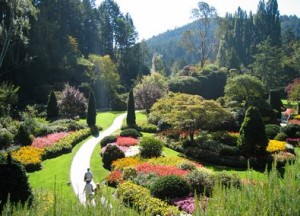Schools and Gardens

Schools and
Gardens
In this series on the metaphor of the school, I've pretty
much concluded that a school is much like a garden. There are many
parallels and the metaphor can be explored on several levels. In the
last post, I look at the issue of "paying due diligence," of following up
and being attentive.
The successful gardener pays attention, so
does the successful teacher.
There's more. The successful
teacher also creates interaction between students so that a major source
of learning concerns the interaction of students. The successful
teacher knows that student-teacher interaction is important, but also
knows that student-teacher interaction is not the only, or necessarily the
primary source of classroom interaction.
The saying, "It's not what
you do that counts. It's what you get them to do that makes the
difference." always seems to sum it up pretty precisely.
And of
course there's that old saw, "Guide on the side and not sage on the
stage."
Here's the point - the successful teacher in The New
Classroom has made that classroom an active place of student centered
activity. The students are doing things which advance a question, create
research, find answers, theorize, plan, and execute. The very best
of learning is when a student becomes the practicing professional -
because as Dewey said, "Education is life."
And the successful
gardener knows that beans and legumes put nitrogen into the soil while
other crops take it out. The successful gardener knows that
marigolds naturally discourage insect pests and plants them in key
places. The successful gardener knows when and where to plant
certain crops - Swiss chard in early spring, and garlic in the
fall.
Anne Cotton writes, "At the very heart of the image is a
connection between education and natural growth. The wise grower outdoes
the foolish one by choosing conditions suitable for growth (the time of
year, the soil, the growing period): his role is to help his seeds achieve
their full potential as natural organisms. The wise educator does the
same, by choosing a soul that provides suitable “soil” for the seed of
discourse to flourish. The analogy suggests that it is simply in the
natural order of things for philosophical development to occur within us.
The only thing that may be lacking is the seed of discourse; once this is
provided, growth can occur in the innate fertility of our souls. Gardening - Philosophy for
Everyone
Both the teacher and the gardener know how to
facilitate growth by creating interactions that work.
